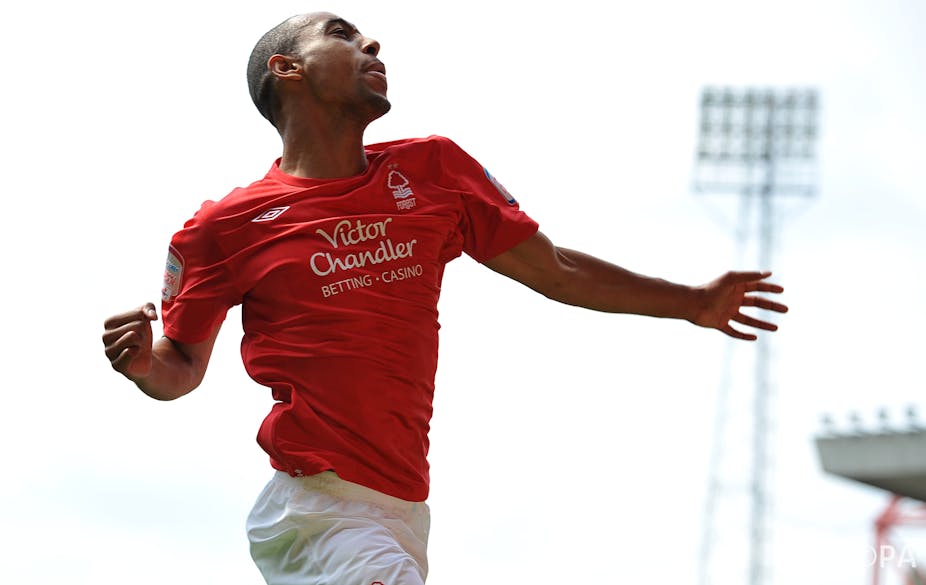Footballers are employees, and they deserve the same protections from loss of earnings through injury as you or I. But the astronomical sums involved in the modern game could lead to a worrying situation where insurance costs start affecting on-pitch actions. Who wants to insure the guy who might break Steven Gerrard’s leg?
The issue is back in the spotlight as Nottingham Forest striker Dexter Blackstock is seeking compensation from Nigerian defender Seyi Olofinjana and his former club Cardiff City over a tackle which Blackstock claims was “negligent”.
The incident occurred in November 2010, during a league match in English football’s second tier between Forest and Cardiff. Blackstock was ruled out for 15 months. Now, he is seeking damages for being deprived of the chance to earn bonuses in this period, as well as the right to further compensation if the injury ends his career early.
The decision to sue Olofinjana and Cardiff City demonstrates the difficulty of deciding if and when the courts will intervene in matters which have taken place on the field of play.
Instances of one professional footballer suing another as a result of injuries sustained during a game are not unheard of, though they occur only infrequently. Perhaps the best known example is the case brought by Chelsea’s Paul Elliot after being injured by Dean Saunders of Liverpool. Elliot lost the case (and was left with a huge legal bill) after he failed to persuade the judge that Saunders had injured him negligently.
These cases are relatively rare, not least because of the difficulty in demonstrating that any legal wrongdoing has occurred. It is a well-established principle that participants in games and sport have an obligation to avoid deliberately harming fellow players, and that they must not cause harm by behaving in an unreasonable manner.
In organised sport such as football the law makes allowances for the physical nature and pace of the game. Behaviour which, in everyday life, would be regarded as unlawful is seen as legitimate. The courts are sympathetic to the notion that injury can and does result from physical contact occurring within the rules of football and other contact sports. Even in the case of foul play, the courts will be slow to intervene where injury results from a reasonable mistake or misjudgement by a player; they accept that this is a part of the game.
There are also practical limitations on legal action in this area. Sports like football are physical and fast-paced, and it will often be extremely difficult for a claimant to demonstrate to the satisfaction of the court that any injury was a result of deliberate or unreasonable behaviour, rather than a legitimate mistake or misjudgement. The result is that it is usually only in the more extreme cases that liability can be shown.
Blackstock’s decision to make a claim against both Olofinjana and his club, Cardiff City, reflects the principle that an employer may be held vicariously liable for the negligent behaviour of an employee. As long as an employee is acting in the course of their employment an employer will be liable for their negligent acts.
This is of particular practical import, because the club will, in most circumstances, be in a better position than the player to pay any compensation that may be awarded. Given the sums that can be awarded, this ability to pay is significant.
In 2008, Manchester United trainee Ben Collett was awarded damages of £4.3m after a career-ending tackle in a reserve game against Middlesbrough. With United legends like Sir Alex Ferguson and Gary Neville testifying in court to Collett’s ability and dedication, and with his whole career still ahead of him, the award was always destined to be huge.
Blackstock, a 27 year old who has spent most of his career in the second tier with QPR and Nottingham Forest, may not be seeking such significant sums. But the true significance of this case may be as a precedent. It is up to the courts to decide whether Olofinjana’s action was “negligent” in the legal sense. However, hardly a game goes by without a crunching tackle or two. If a court were to set too low a threshold for injured players to obtain compensation, we could see many more such claims.
Insurers will be right to worry. Collett’s compensation was paid by Middlesbrough’s insurers, who can’t have been thrilled to see a reserve game cost them £4.3m. But what if the next Ben Collett or Dexter Blackstock was £300k per week Wayne Rooney? We could eventually see a situation where insurers refuse to cover teams playing against high-value opposition.
Though footballers are entitled to and deserve protection from the repercussions of serious injury, the worry is that they are getting too valuable for their own good.

